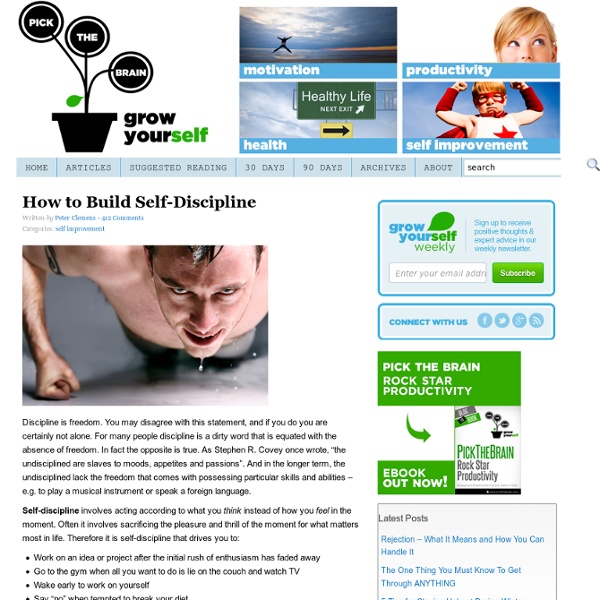Recycled Docking Stations… Wood you believe it?
We’re loving the latest design trend in docking stations for your gadgets….recycled wood., take a look at some of the upcycled products currently on the market. Wood made docking stations from recycled materials are one of the innovative items available today. The docking stations made from reclaimed or recycled materials are all the rage these days. This iPhone docking unit made from recycled rosewood retails for around $168 (84GBP) This phone charger had a previous life as a golf club.
Existential Crisis and How to Overcome it
An existential crises is that point in our lives where we encounter the absurd as a formidable opponent. It has crept into our lives, uninvited, and challenging the very meaning of existence. The crisis is strong: it can take away the colors of the world around us making it dull.
43 Simple Ways To Simplify Your Life
Post written by Sherri Kruger. Follow me on Twitter. Simplicity. How can we make things simpler, more streamlined, or more efficient?
The Meaning of Life: An interview with Professor A C Grayling
PETER BRIETBART meets world-renowned philosopher, humanist and atheist A.C. GRAYLING, Professor of Philosophy at Birkbeck, University of London and a supernumerary fellow of St Anne’s College, Oxford. He is a prolific author, whose works include Against All Gods, Liberty in the Age of Terror and Ideas That Matter, and he is a regular contributor to the Guardian newspaper. Their discussion ranges from burqa bans to circumcision, free will, great literature and the right to die.
Why harmony pleases the brain - physics-math - 19 September 2011
The key to pleasant music may be that it pleases our neurons. A new model suggests that harmonious musical intervals trigger a rhythmically consistent firing pattern in certain auditory neurons, and that sweet sounds carry more information than harsh ones. Since the time of the ancient Greeks, we have known that two tones whose frequencies were related by a simple ratio like 2:1 (an octave) or 3:2 (a perfect fifth) produce the most pleasing, or consonant, musical intervals. This effect doesn't depend on musical training – infants and even monkeys can hear the difference. But it was unclear whether consonant chords are easier on the ears because of the way the sound waves combine in the air, or the way our brains convert them to electrical impulses.
iTree iPhone & iPod dock are created out of a tree trunk
If our mention on the title confuses you, we would like to tell you about the iTree docking station by KMKG, which has been made out of the log of a tree trunk! This docking station has the ports needed to charge your iPod or iPhone, as well as plays stored audio content at the same time. What makes this product rather abstract, is that it’s been created out of wood, which is hand selected by the customer and built according to the individual needs. The iTree is all innovative in designing and general aesthetics.
Top 40 Useful Sites To Learn New Skills
The web is a powerful resource that can easily help you learn new skills. You just have to know where to look. Sure, you can use Google, Yahoo, or Bing to search for sites where you can learn new skills , but I figured I’d save you some time. Here are the top 40 sites I have personally used over the last few years when I want to learn something new. Hack a Day - Hack a Day serves up fresh hacks (short tutorials) every day from around the web and one in-depth ‘How-To hack’ guide each week.eHow - eHow is an online community dedicated to providing visitors the ability to research, share, and discuss solutions and tips for completing day-to-day tasks and projects.Wired How-To Wiki - Collaborate with Wired editors and help them build their extensive library of projects, hacks, tricks and tips.
20 Ways To Train Your Brain For Peak Performance
In order to stay sharp, it is important that you exercise your brain. The less we use our minds, the duller they become. There is a lot of emphasis these days on staying physically healthy, but we should also be concerned for our mental well-being. Our brains continue to expand and adapt to the stimuli they receive throughout our lives.
20+ Ways to Learn a Language Online
Earlier today we mentioned a plugin for AIM that would translate what you type on the fly into another language. That's an exceptionally useful tool, but the far more fluid and accurate way to speak to people in another language, is to actually learn the language. Thankfully, there are a wide variety of ways to learn languages online, many of them available for free. Below is a list of more than 20 ways you can go from knowing how to say "Hello" to fluency. Language Lessons
Possibilianism
Not to be confused with Possibilism. Possibilianism is a philosophy which rejects both the diverse claims of traditional theism and the positions of certainty in strong atheism in favor of a middle, exploratory ground.[1][2][3][4][5] The term was first defined by neuroscientist David Eagleman in relation to his book of fiction Sum: Forty Tales from the Afterlives.[6] Asked whether he was an atheist or a religious person on a National Public Radio interview in February 2009, he replied "I call myself a Possibilian: I'm open to...ideas that we don't have any way of testing right now."[6] In a subsequent interview with the New York Times, Eagleman expanded on the definition: "Our ignorance of the cosmos is too vast to commit to atheism, and yet we know too much to commit to a particular religion.



